ChapterOne
牛津英语8A ChapterOne

8A Chapter1掌握词语ambition n. 雄心;野心;企图 all in 筋疲力尽的 enclose v. 封入;附寄physics n. 物理学 probably adv. 大概;也许 be keen on 喜爱rugby n. 橄榄球 shut v. 关上;闭上 university n. (综合)性大学hockey n. 曲棍球 badminton n. 羽毛球 tennis n. 网球foot n. 英尺;脚认知词语steak n.牛排;大块肉片 punch n. 酒、柠檬、糖等混成的饮料 idle adj. 懒惰的;闲的inaudible adj. 听不见的 inch n. 英寸 European n. 欧洲人actor n. 男演员actress n. 女演员 recently adv.近来的alphabetical adj. 按字母顺序的encyclopaedia n.百科全书 couple n. 夫妇;一对;一双adopt v. 收养(子女) omen n. 预兆;征兆 arrival n. 到达destine v. 注定;命定fortune n.命运;运气embassy n. 大使馆;大使职务housekeeper n. 女管家 chief adj. 主要的;首要的drama n. 戏剧;戏曲;剧本 academy n. 高等学校;专科学校Reading A letter from a pen-friendDear MayHi! I saw your name and address in “pen-friends’magazine, and I would like to be your pen-friend. First, I will tell you some things about myself. My name is Sidney Li Pei-chun. I’m fourteen years old. I’m about five feet tall. I have short black hair and brown eyes.My favourite hobby is playing computer games. I also enjoy playing chess.I live with my parents. They came to England about 30 years ago. They came from HongKong, but I have never been there. Now my parents own a Chinese restaurant in Newcastle. We live in a small house near our restaurant. I was born in Newcastle in 1986. I can speak Chinese, but I cannot write it very well. I have a brother called Edwin. He is 23. He works as an architect, in London.I’m in Form One at Walker School. It is near my house, and so I can walk to school. I like my school because the teachers are very friendly. My school has many sports fields. I am keen on sports. I enjoy playing rugby and badminton in the winter, and tennis in the summer. My best subject at school is physics. My ambition is to be an engineer.I enclose a photo of myself and some school friends. I am in the middle. I hope youwill write to me soon, May, and tell me all about yourself.Best wishesSidney短语大连接1 . get a letter from sb . 收到某人的来信,也可说成hear from sb.如:I have got a letter from her .也可说成:I have heard from her . 我收到了她的来信。
外贸英语函电第六版兰天编著ChapterOne省公开课金奖全国赛课一等奖微课获奖PPT课件
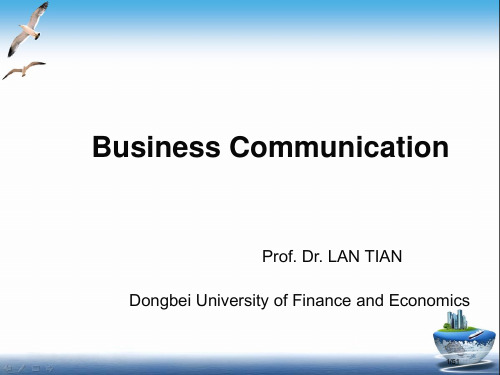
5/51
the letterhead/heading the references the date the inside name and address the salutation the subject heading/caption the opening paragraph the body of the letter the closing paragraph the complimentary close the signature the enclosures and copies the postscript
11/51
American English---Gentlemen: British English--- Dear Sirs, 敬启者,执事先生… Dear Sir or Madam: Dear Madam +Chairperson (Use neutral job titles ):
12/51
The subject heading The subject heading is inserted after the salutation. A subject heading should not end with a full stop. Typical subject headings would be: a. SALE OF PROPERTY IN THE RIVERSIDE DISTRICT b. Order No.123 c. Re: Order No. 123
Chapter One—Chapter Three

Chapter One—Chapter Three hapter ne—hapter Three【本讲教育信息】一教学内容:Revisin: Fr hapter ne t hapter Three二重难点词汇:1 be een n 喜爱=lie ding stheg: He is een n plaing ftball =He lie plaing ftball2 be siilar t 与……相似,其反义词:be different fr 与……不同eg: T is siilar t ther students3 be respnsible fr 对……负责eg: The an is respnsible fr sales4 fail an exa 考试不及格,与fail有关的词组有:fail t d sth =fail in ding sth 做某事失败ntinue ding sth 继续做某事=g n ding sth6 shut at 对着……喊(不友善的)shut t 对……大喊(没有不友好的)7 stare at 盯着看:l at sth ith interest8 steal sth fr sb 从某人那里偷到什么,容易与它混淆的:rb sb f sth 从某人那里抢什么东西。
rb (v )抢劫--- rbber (n )抢劫犯---rbber (n )抢劫案9 be afraid f sth 害怕……与此相关的词组:be afraid f ding sth 害怕做某事be afraid t d sth 担心做某事这两个词组有时可以相等,但是有时不能替换。
eg: I a afraid f ging ut at night 不能说成I a afraid t g ut at night 10 hpe t d sth 希望做某事hpe+that 从句eg: I hpe u ill rite t e sn注意:绝对不能用hpe sb t d sth希望某人做某事可以说成:expet sb t d sth三重点句子:1 I a abut five feet tall 我大概有五英尺高。
chapter用法
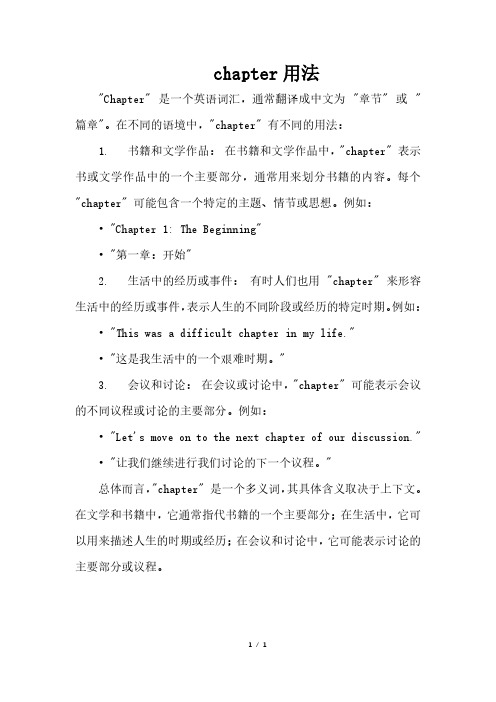
chapter用法"Chapter" 是一个英语词汇,通常翻译成中文为"章节" 或"篇章"。
在不同的语境中,"chapter" 有不同的用法:1. 书籍和文学作品:在书籍和文学作品中,"chapter" 表示书或文学作品中的一个主要部分,通常用来划分书籍的内容。
每个"chapter" 可能包含一个特定的主题、情节或思想。
例如:• "Chapter 1: The Beginning"• "第一章:开始"2. 生活中的经历或事件:有时人们也用 "chapter" 来形容生活中的经历或事件,表示人生的不同阶段或经历的特定时期。
例如:• "This was a difficult chapter in my life."• "这是我生活中的一个艰难时期。
"3. 会议和讨论:在会议或讨论中,"chapter" 可能表示会议的不同议程或讨论的主要部分。
例如:• "Let's move on to the next chapter of our discussion."• "让我们继续进行我们讨论的下一个议程。
"总体而言,"chapter" 是一个多义词,其具体含义取决于上下文。
在文学和书籍中,它通常指代书籍的一个主要部分;在生活中,它可以用来描述人生的时期或经历;在会议和讨论中,它可能表示讨论的主要部分或议程。
1/ 1。
Chapter One(A) 英语词汇学课程简介

兼任 湖北省学位委员会评议组成员、华中师范大学学位 委员会第3、4届委员、教育部人文社科基地华中师大语言 与语言教育研究中心兼职研究员。学术兼职包括全国专业 英语研究会理事、中南地区外语教学法研究会副理事长、 湖北省翻译者协会副会长、武汉欧美同学会常务理事等。 被邀担任教育部全国本科教学评估专家和教育部出国留学 基金语言学评审专家。同时担任上海外语教育出版社教育 部"十五"规划项目英语专业教材编写委员会委员,重庆出 版社中西部英语专业系列教材编写委员会委员。 主讲 英语词汇学、文体学、语义学等理论课程。从事语 言学和应用语言学方面的研究,并对话语篇章、语用、语 言与文化等有浓厚的兴趣。
近年来,汪榕培教授在中国古典文学英译和中西 文化比较等方面取得了突破性的进展,先后完成 了 《英译老子》、《英译易经》、 《英译陶诗》、 《英译诗经》、《英译庄子》、 《英译邯郸记》 《英译汉魏六朝诗三百首》、 《英译牡丹亭》、 《英译孔雀东南飞· 木兰诗》、等译著, 并撰写了一系列相关的论文,出版了专著《比较 与翻译》和《陶渊明诗歌英译比较研究》,得到 国内外学者的高度重视。他目前正在继续进行典 籍英译研究工作,兼任苏州大学、大连理工大学 博士生导师。
What we shall learn in ish lexicology is more than to learn to remember new words,but it will make you powerful in learning new words. 有人误认为词汇学就是“学词汇”。
4.所有作业,独立完成,不能抄袭 ,否则扣分。
Chapter One
The Basic Concepts of Words and Vocabulary
Chapter One 主谓一致 Subject-predicate Agreement

Chapter One 主谓一致Subject-predicate Agreement一、基本概念主谓一致指的是句子的谓语动词与其主语在数上必须保持一致,句子的主语是第三人称单数,其谓语动词须用第三人称单数,主语是复数,则谓语动词用复数形式。
主谓一致遵循三个原则:语法一致、意义一致、就近原则。
(一)语法一致的原则谓语和主语通常从语法形式上取得一致,主语为单数形式,谓语动词也用单数形式;,主语为复数形式,谓语动词也为复数形式。
(即单对单,复对复)(1) 以单数名词或代词,动词不定式短语作主语时,谓语动词要用单数;主语为复数时,谓语用复数,例如:He goes to school early every morning.The children are playing outside.To work hard is necessary for a student.(2) 由and或both……and连接的并列成分作主语时,谓语动词用复数。
例如:Both he and T are right.Mr Black and Mrs Black have a son called Tom.✧注意:但并列主语如果指的是同一人,同一事物或同一概念,谓语动词用单数。
例如:His teacher and friend is a beautiful girl.The poet and writer has come.(3) 由and连接的并列单数主语之前如果分别由each, every修饰时,其谓语动词要用单数形式。
例如: In our country every boy and every girl has the right to receive education.Each man and each woman is asked to help.(4)主语是单数时,尽管后而跟有but,except, besides, with等介词短语,谓语动词仍用单数。
英语语言学Chapter 1

Chapter OneⅡ. 1. Chomsky defines “competence” as the ideal user’s k of the rulesof his language.2. Langue refers to the a linguistic system shared by all the members of a speech community while the parole is the concrete use of the conventions and application of the rules.3. D is one of the design features of human language which refers to the phenomenon that language consists of two levels: a lower level of meaningless individual sounds and a higher level of meaningful units.4. Language is a system of a vocal symbols used for human communication.5. The discipline that studies the rules governing the formation of words into permissible sentences in languages is called s .6. Human capacity for language has a g basis, but the details of language have to be taught and learned.7. P refers to the realization of langue in actual use.8. Findings in linguistic studies can often be applied to the settlement of some practical problems. The study of such applications is generally known as a linguistics.9. Language is p in that it makes possible the construction and interpretation of new signals by its users. In other words, they can produceand understand an infinitely large number of sentences which they have never heard before..10. Linguistics is generally defined as the s study of language.11. Language is a system of a symbols used for human communication. use, it is said to be d ; if it aims to lay down rules for “correct” behavior,it is said to be p .14. In modern linguistics, S study seems to enjoy priority over d study. The reason is that successful studies of various states of a language would be the foundations of a historical study.15. Langue refers to the a linguistic system shared by all the members ofa speech community; and parole refers to the r of langue in actual use.16. Chomsky defines competence as the ideal user’s k of the rules of his language, and performance, the actual r of this knowledge in linguistic communication.17. “ A rose by any other name would smell as sweet”. This famous quotation from Shakespeare illustrates that language has the design feature ofa .18. The property of d of language provides a speaker with an opportunity to talk about a wide range of things, free from barriers caused by separation in time and place.19. Language is a system, which consists of two sets of structures, one of Sounds, and the other of w . This double articulation of language enables its users to talk about anything within their knowledge.20. An English speaker and a Chinese speaker are both able to use language, but they are not mutually intelligible, which shows that language is culturally t .III.1. The study of _____ does NOT form the core of linguistics.A. syntaxB. pragmaticsC. morphologyD. sociolinguistics2. If the study of meaning is conducted in the context of language use, a branch of linguistic study called _____ come into being.A. syntaxB. semanticsC. morphologyD. pragmatics3. Which of the following statements is no the concern of psycholinguistics?A. It aims to answer such questions as how the human mind works when we use languageB. It relates the social norms that determine the type of language to be used in a certain occasion.C. It pays more attention to the study of language acquisition in childrenD. It focuses on the way of processing the information we receive in the course of communication.4. Which of the following words is the entire arbitrary one?A. bookB. beautifulC. crashD. newspaper5. Which of the following items is not a design feature of human language?A. arbitrarinessB. competenceC. displacementD. productivity6. The difference between modern linguistics and traditional grammar are all of the following EXCEPT _______A. descriptive vs. prescriptiveB. non Latin-based vs. Latin-based frameworkC. spoken vs. writtenD. competence vs. performance7. The term _____ linguistics may be defined as a way of referring to the approach which studies language change over various periods of time and at various historical stage.A. synchronicB. comparativeC. diachronicD. historical comparative8. Which word is the absolute arbitrary one?A. carefulB. handbagC. crackD. table9. The application of linguistics principles and theories to language teaching and learning is called _____.A. sociolinguisticsB. PsycholinguisticsC. computational linguisticsD. Applied Linguistics10. ______ is regarded as the “Father of modern linguistics”.A. ChomskyB. SaussureC. HallidayD. Whorf11. Competence refers to ________.A. the ideal language user’s knowledge of the rules of his languageB. the actual realization of the language user’s knowledge of the rules in utterancesC. knowledge of meaning of words and sentencesD. what speakers can actually do with language12. The subject area on the borders of linguistics and literature has become known as _____ .A. anthropological linguisticsB. linguistic stylisticsC. neurolinguisticsD. mathematical linguistics13. The distinction between competence and performance is similar to the distinction between ________.A. prescriptive & descriptiveB. synchronic and diachronicC. speech and writingD. langue & parole14. _____ answers such questions as how we as infants acquire our first language.A. applied linguisticsB. sociolinguisticsC. psycholinguisticsD. anthropological linguistics15. Children can speak before they can read or write shows that ______.A. language is arbitraryB. language is productiveC. language is used for communicationD. language is basically vocal16. _____ means the lack of logical connection between the form of something and its expression in sounds.A. AmbiguityB. FuzzinessC. AbstractnessD. Arbitrariness17. Which of the following statements about language is NOT TRUE?A. Language means the system of pronunciation, grammar and vocabularyB. Language includes animal and artificial features of languageC. Language means a particular type or style of language used for a particular purposeD. Language refers to the common features of all human languages18. All human languages are organized on two levels: the sound level –meaningless, the grammatical level – meaningful. This means language has the design feature of _______.A. dualityB. changeableC. creativeD. arbitrary19. ____ are two sub-branches of linguistics that study the units at the grammatical level.A. morphology and semanticsB. morphology and syntaxC. semantics and syntaxD. morphology and phonology20. ____ dictionary established a uniform standard for English spelling and word use.A. LongmanB. OxfordC. Webster’sD. Johnson’s21. Langue & Parole are a pair of important distinctions put forward by_______ .A. ChomskyB. LyonsC. SaussureD. Halliday22. Language has the feature of ____ in the sense that users can understand and produce sentences they have never heard before.A. dualityB. interchangeabilityC. displacementD. productivity23. Linguistics gives priority to the spoken language instead of the written language because ______.A. vocal sounds are derived from writing systemsB. spoken language precedes written language only in Indo-European languagesC. we have recording devices to study speech in modern timesD. speech precedes writing everywhere in the world24. The distinction between competence and performance is made by _____ in _______.A. F. de. Saussure; SwissB. Noam Chomsky; USAC. M. A. K. Halliday; UKD. L. Bloomfield; USA25. If a linguistic study describes and analyzes the language people actually use, it is said to be _______.A. prescriptiveB. analyticC. descriptiveD. linguistic26. Which of the following is not a design feature of human language?A. ArbitrarinessB. DisplacementC. DualityD. Meaningfulness27. Modern linguistics regards the written language as _______.A. primaryB. correctC. secondaryD. stable28. In modern linguistics, speech is regarded as more basic than writing, because _______.A. in linguistic evolution, speech is prior to writingB. speech plays a greater role than writing in terms of the amount of information conveyedC. speech is always the way in which every native speaker acquires his mother tongueD. All of the above29. A historical study of language is a_______ study of language.A. synchronicB. diachronicC. prescriptiveD. comparative30. Saussure took a(n) _______ view of language, while Chomsky looks at language from a ________ point of view.A. sociological, psychologicalB. psychological, sociologicalC. applied, pragmaticD. semantic, linguistic31. According to F. de Saussure, _______ refers to the abstract linguistic system shared by all the members of a speech community.A. paroleB. performanceC. langueD. Language32. Language is said to be arbitrary because there is no logical connection between _______ and meanings.A. senseB. soundsC. objectsD. ideas33. Language can be used to refer to contexts removed from the immediate situations of the speaker. This feature is called _______.A. displacementB. dualityC. flexibilityD. cultural transmission34. The details of any language system is passed on from one generation to the next through _______, rather than by instinct.A. learningB. teachingC. booksD. both A and B。
八年级英语上册ChapterOne—ChapterThree语法重难点复习牛试题
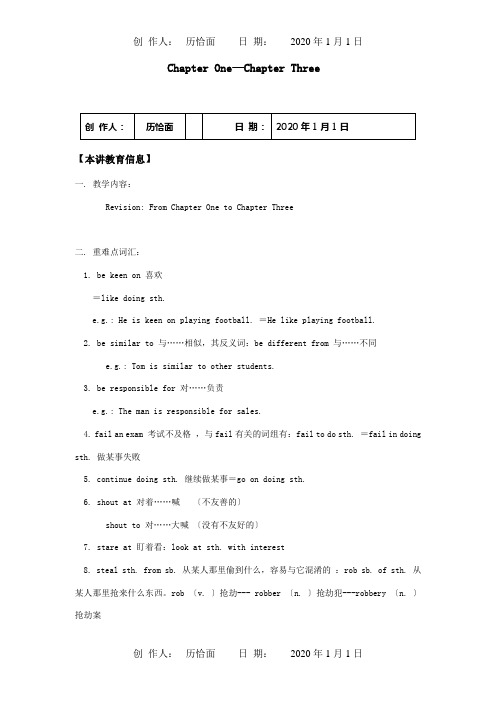
Chapter One—Chapter Three【本讲教育信息】一. 教学内容:Revision: From Chapter One to Chapter Three二. 重难点词汇:1. be keen on 喜欢=like doing sth.e.g.: He is keen on playing football. =He like playing football.2. be similar to 与……相似,其反义词:be different from 与……不同e.g.: Tom is similar to other students.3. be responsible for 对……负责e.g.: The man is responsible for sales.4. fail an exam 考试不及格,与fail有关的词组有:fail to do sth. =fail in doing sth. 做某事失败5. continue doing sth. 继续做某事=go on doing sth.6. shout at 对着……喊〔不友善的〕shout to 对……大喊〔没有不友好的〕7. stare at 盯着看:look at sth. with interest8. steal sth. from sb. 从某人那里偷到什么,容易与它混淆的:rob sb. of sth. 从某人那里抢来什么东西。
rob 〔v. 〕抢劫--- robber 〔n. 〕抢劫犯---robbery 〔n. 〕抢劫案9. be afraid of sth. 害怕……与此相关的词组:be afraid of doing sth. 害怕做某事be afraid to do sth. 担忧做某事这两个词组有时可以相等,但是有时不能交换。
e.g.: I am afraid of going out at night. 不能说成 I am afraid to go out at night.10. hope to do sth. 希望做某事hope+that 从句 e.g.: I hope you will write to me soon.注意:绝对不能用 hope sb. to do sth.希望某人做某事可以说成:expect sb. to do sth.三. 重点句子:1. I am about five feet tall. 我大概有五英尺高。
大学英语跨文化交际 chapter one

Chapter One Culture
Purpose of this chapter
1. Understand the definitions of culture 2. Describe the functions and characteristics of culture 3. Summarize the process of the formation of cultural identity 4. Evaluate cultural diversity
Outline
1.The nature of culture: Iceberg, Software, Water, Grammar 2.Definition: Anthropological, Psychological, Sociological, Inte rcultural 3.Characteristics: Learned, Dynamic, Pervasive, Integrated, Adapti ve
Intercultural perspective “Culture is a system of shared beliefs, values, customs, behaviors, and artifacts that the members of a society use to cope with their world and with one another, and that are transmitted from generation to generation through learning.” —— Daniel Bates & Fred Plog 文化就是一个能够被某个社会的成员用来生活和 彼此交流的体系;该体系包括信念、价值、习俗、 行为和器皿等;它们通过学习世代相传。
汉英翻译(chapter one) 第一章 翻译的过程

2013年2月25日
一、翻译的过程
(一)理解阶段 1.语义分析 语义分析是语言分析的一个分支,说明处在 一定语境中,按照一定次序排列的词项之间 的语义关系,探索词项的意义。把握好原语 的全部意义,是翻译成效的关键。
琼州学院外国语学院
2
1)注意词的概念意义和关联意义。
琼州学院外国语学院 8
3.语用分析
语用分析,是通过语用学的思考,对语言的 交际意义进行综合分析的方法之一,旨在了 解和确定讲话人与所讲话语之间的关系,或 者说旨在把握语言符号与使用该语言符号的 人的关系。 这种关系常常表现为讲话人的感情、态度、 情绪、意念等。了解这一点对于翻译来说是 至关重要的。
琼州学院外国语学院
12
(二)表达阶段
1、直译(Literal Translation) 习语极富哲理、形象鲜明,深深植根于社会 习俗和文化传统之中,遇有原文用意独特而 汉语又无对应说法的谚语,可采用直译法。 但要注意的是,直译并非逐字对译,而是取 其题旨用意和比喻形象,兼顾原文修辞效果。 直译法如运用得当,可扩大读者的知识,丰 富汉语的表达能力。
11
琼州学院外国语学院
2)弄清讲话人的意图,进而决定表达方式。
① Harry is a professor, but can’t spell. 哈利是教授,奇怪的是不会拼写。 ② And you talked to him this way after all he had done for you. 人家帮了你那么多忙,你怎么竟这样跟人家 讲话呢?
① seat oneself in a wooden chair 坐在木椅里 ② accept a university chair 同意在大学里执教 ③ chair the board meeting 主持董事会 ④ condemned to the chair 被处电刑
chapter的相关用法
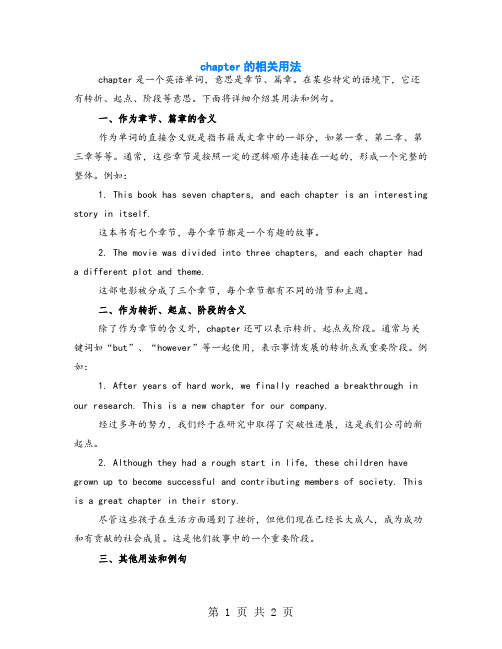
chapter的相关用法chapter是一个英语单词,意思是章节、篇章。
在某些特定的语境下,它还有转折、起点、阶段等意思。
下面将详细介绍其用法和例句。
一、作为章节、篇章的含义作为单词的直接含义就是指书籍或文章中的一部分,如第一章、第二章、第三章等等。
通常,这些章节是按照一定的逻辑顺序连接在一起的,形成一个完整的整体。
例如:1. This book has seven chapters, and each chapter is an interesting story in itself.这本书有七个章节,每个章节都是一个有趣的故事。
2. The movie was divided into three chapters, and each chapter hada different plot and theme.这部电影被分成了三个章节,每个章节都有不同的情节和主题。
二、作为转折、起点、阶段的含义除了作为章节的含义外,chapter还可以表示转折、起点或阶段。
通常与关键词如“but”、“however”等一起使用,表示事情发展的转折点或重要阶段。
例如:1. After years of hard work, we finally reached a breakthrough in our research. This is a new chapter for our company.经过多年的努力,我们终于在研究中取得了突破性进展,这是我们公司的新起点。
2. Although they had a rough start in life, these children have grown up to become successful and contributing members of society. This is a great chapter in their story.尽管这些孩子在生活方面遇到了挫折,但他们现在已经长大成人,成为成功和有贡献的社会成员。
新思维4B Chapter One词汇练习(原朗文教材)
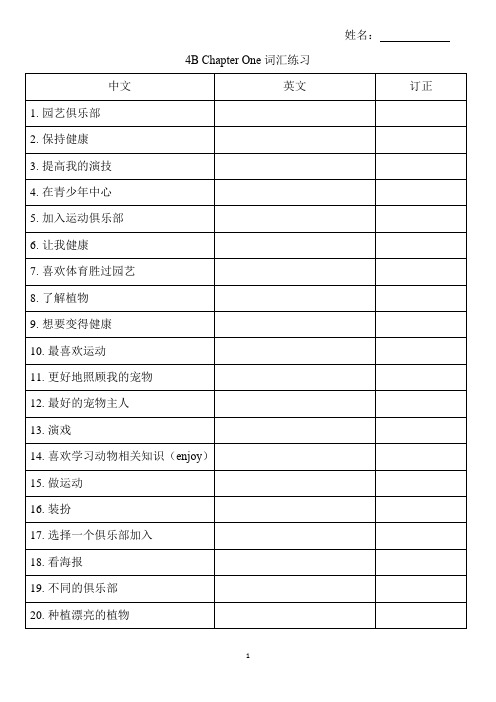
中文
英文
订正
1.园艺俱乐部
2.保持健康
3.提高我的演技
4.在青少年中心
5.加入运动俱乐部
6.让我健康
7.喜欢体育胜过园艺
8.了解植物
9.想要变得健康
10.最喜欢运动
11.更好地照顾我的宠物
12.最好的宠物主人
13.演戏
14.喜欢学习动物相关知识(enjoy)
15.做运动
like sport best
11.更好地照顾我的宠物
take better care of my pets
12.最好的宠物主人
the best pet owner
13.演戏
act in a play
14.喜欢学习动物相关知识(enjoy)
enjoy learning about animals
15.做运动
16.装扮
17.选择一个俱乐部加入
18.看海报
19.不同的俱乐部
20.种植漂亮的植物
4BChapterOne词汇练习参考答案
中文
英文
订正
1.园艺俱乐部
the Gardening Club
2.保持健康
keep fit/healthy
3.提高我的演技
improve my acting
4.在青少年中心
at a youth centre
do sport
16.装扮
dress up
17.选择一个俱乐部加入
choose a club to join
18.看海报
look at the sters
19.不同的俱乐部
different clubs
牛津英语词汇拓展(Chapter One)

3. …point the tips of your skis together. Used as vi.指着 指着 1)He is pointing at me.他正指着我。 他正指着我。 他正指着我 2)The clock hand points to 12.时钟的指针指向 。 时钟的指针指向12。 时钟的指针指向 Used as vt. 用手指(枪 指向 指向…… 用手指 枪)指向 point the finger/gun at… Used as n.要点 作用 点 要点,作用 要点 作用,点 I am absent-minded and missed some important language points in the class. on the point of 表示“立即,要……” 表示“立即, ” 花瓶要掉下来了。 花瓶要掉下来了。 The vase is on the point of falling.
牛津英语词汇拓展( 牛津英语词汇拓展(Chapter One) ) 1.congratulate vt.祝贺 祝贺 Congratulate sb. On sth.
We came to congratulate her on her good luck. 祝贺,常以复数形式出现。 Congratulatme out as the first one in the exam. 我考试得了第一。 我考试得了第一。 —Congratulations ! I received their sincere congratulations. 我接受了他们衷心的祝福。 我接受了他们衷心的祝福。
adv.一定地, 一定地, 一定地 2. …the next day I definitely improved.确定地 他一定得了可怕的病。 他一定得了可怕的病。
朗文英语六上chapter1复习.doc
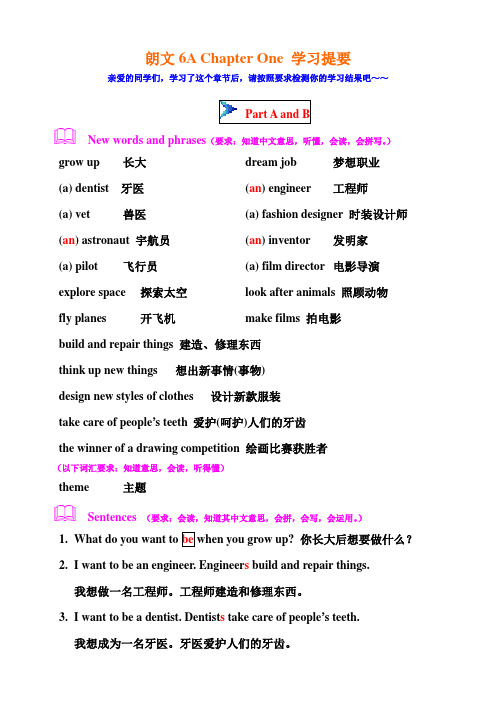
朗文6A Chapter One 学习提要亲爱的同学们,学习了这个章节后,请按照要求检测你的学习结果吧~~Part A and BNew words and phrases(要求:知道中文意思,听懂,会读,会拼写。
)grow up 长大dream job 梦想职业(a) dentist 牙医(an) engineer 工程师(a) vet 兽医(a) fashion designer 时装设计师(an) astronaut 宇航员(an) inventor 发明家(a) pilot 飞行员(a) film director 电影导演explore space 探索太空look after animals 照顾动物fly planes 开飞机make films 拍电影build and repair things 建造、修理东西think up new things 想出新事情(事物)design new styles of clothes 设计新款服装take care of people’s teeth 爱护(呵护)人们的牙齿the winner of a drawing competition 绘画比赛获胜者(以下词汇要求:知道意思,会读,听得懂)theme 主题Sentences (要求:会读,知道其中文意思,会拼,会写,会运用。
)1.What do you want to be when you grow up? 你长大后想要做什么?2.I want to be an engineer. Engineer s build and repair things.我想做一名工程师。
工程师建造和修理东西。
3.I want to be a dentist. Dentist s take care of people’s teeth.我想成为一名牙医。
牙医爱护人们的牙齿。
4.I want to be an astronaut. Astronaut s explore space.我想做一名宇航员。
英语语法 Chapter One 时态 (1) ( Tense)

当我到戏院时电影已经开始10分钟了。
16
一般过去时和过去完成时的区别: 一般过去时和过去完成时的区别:
一般过去时是过去的一个特定的时间。而过去完成时表示这一时间之前的 行动。 He knew President was in the next room. He knew President had been in the next room. He bought a computer when he entered the college. He had bought a computer when he entered the college.
9
在大学英语四、六级语法中,时态是一个必测题, 测试的重点主要有: 1.完成时态—— 现在完成时,过去完成时,将来 完成时。 2.进行时态—— 现在进行时,过去进行时,现在 完成进行时。 3一般将来时
10
完成时态
1. 现在完成时(Present Perfect) 构成: Have ( has ) + 过去分词
17
3. 将来完成时 (Future Perfect) 构成: will ( shall ) + have done
18
用法: 表示在将来一个特定时间之前已经完成的动作或行为。 常和by the end, by the time …. 等时间状语连用。
I hope we will have pulled through the crisis by the end of this year. 我希望今年年底前我们可以度过这个难关。 By the end of July we will have studied 8 units. 7月底我们将学习第8单元。 By the time of next year, I have got my bachelor degree. 明年的这个时候,我将拿到我的学士学位。
语言学内容讲义 Chapter One

Chapter One Invitation to LinguisticsTeaching aims: let the students have the general idea about linguistics as the science of languageFocal points: design features; functions of languageTeaching difficulties: design features; important distinctions in linguisticsTeaching procedure:Outline of this chapter:1 Why study language?2 What is language?3 Design features of language3.1 Arbitrariness3.1.1 concept3.1.2 two levels3.1.3 Arbitrariness and convention 3.2 Duality二重性3.2.1 concept3.2.2 two levels3.2.3 advantages3.3 Creativity创造性3.3 .1 concept3.3 .2 two senses3.4 Displacement移位性3.4.1 concept3.4.2 three senses4 Origin of language语言的起源4.1 The bow-wow theory汪汪理论4.1.1 arguments4.1.2 evidence4.1.3 problem4.2 The pooh-pooh theory噗噗理论4.2.1 arguments4.2.2 evidence4.2.3 problem4.3 The ―yo-he-ho‖ theory吆嗬吆理论4.3.1 arguments4.3.2 evidence4.3.3 problem5 Functions of language语言的功能5.1 schools5.1.1 the Prague School5.1.2 the London School5.2 Functions of language6 What is linguistics? p147 Main branches of linguistics8 Macrolinguistics9 Some important distinctions in linguistics1 Why study language?Language is such an integral part of our life and humanity that too much about it has been taken for granted. For some people, language may not even be a worthy subject for academic study. They take it as a tool for access to some other fields rather than study it as a subject in and of itself. However, if you pause and think of the following myths about language, it is indeed necessary to reconsider how much we really understand the nature of language and its role in our life. And you may be surprised to realize that some of our most damaging racial, ethnic, and socioeconomic prejudices are based on our linguistic ignorance and wrong ideas about language.The following are some fundamental views about LANGUAGE, which you may instinctively agree without having thought about the reasons,or you may not agree at the moment. Follow this course and you will find they are discussed in more detail in the ensuing chapters.1).Children learn their native language swiftly, efficiently and without instruction.2).Language operates by rules.3). All languages have three major components; a sound system, a systemof lexico-grammar and a system of semantics.4).Everyone speaks a dialect.5).Language slowly changes.6).Speakers of all languages employ a range of styles and a set of jargons.7).Languages are intimately related to the societies and individuals that use them.8).Writing is derivative of speech.Some people find the subject of language intriguing and useful for many different reasons. Language can be used as a way of finding out more about how the brain works, or how damage to the brain results in certain kind of language disorders, how children learn language, how people learn and teach different languages, what the relationship between meaning and perception is, what the role of language is different cultures, why people use different varieties of language, why there are linguistic differences between different groups, and how scientists make the computer work in a more human-like manner. This course book will serve as a starting point from which you may go on researching in one of the above and other language-related fields.2 What is language?Webster‘s New World Dict ionary offers several most frequently used senses of the word ―language‖, namely,Language is human speech; the ability to communicate by this means; a system of vocal sounds and combinations of such sounds to which meaning is attributed, used for the expression or communication of thoughts and feelings; the written representation of such a system. (Webster's New World Dictionary)Most widely accepted definition of language is that a language is a system of arbitrary vocal symbols by means of which the members of speech community communicate , interact and transmit their culture.3 Design features of languageThe features that define our human languages can be called DFESIGN FEATURES. The following are the frequently discussed ones.3.1 Arbitrariness3.1.1 conceptThe widely accepted meaning of this feature, which was discussed by Saussure, first refers to the fact that the forms of linguistic signs bear no natural relationship to their meaning.For instance, we cannot explain why a book is called a / buk / and a pen a / pen /. However there seems to be different levels of ARBITRARINESS.3.1.2 two levels1) Word level: Arbitrary relationship between the sound of a morpheme and its meaning.(1)we cannot explain why a book is called a / buk / and a pen a / pen /. (2)And we cannot explain why a book is called a / buk / in English ,书in Chinese .You may object to this when you think of words with different degrees of onomatopoeia, namely, words that sound like the sounds they describe.e.g. In Chinese, these linguistic forms seem to have a natural basis. But in English, totally different words are used to describe the sound. For example, the dog barks wow wow in English but wangwangwang in Chinese.2) Sentence level: Less arbitrariness at the syntactic level According to systemic-functionalists and American functionalists, language is not arbitrary at the syntactic level.(1)By syntax we refer to the ways that sentences are constructedaccording to the grammar of arrangement. We know, the order of elements in a sentence follows certain rules.(2)And there is a certain degree of correspondence between the sequence of clauses and the real happenings.In other words, syntax(sentence) is less arbitrary than words, especially in so far as this kind of order is concerned.Compare the sentence at P5:When we say (a) we refer to the sequence of actions; if we say (b) the readers will take it as meaning the opposite sequence of real happenings—perhaps he got into his wheelchair and propelled himself into the room. In (c) with the help of the word ―after‖ we can reverse the order of the clauses. Therefore the functionalists hold that the most strictly arbitrary level of language exists in the distinctive units of sounds by which we distinguish pairs of words like pin and bin, or fish and dish.3.1.3 Arbitrariness and conventionWhat then is the link between a linguistic sign and its meaning? It is a matter of CONVENTION. Here we have to look at the other side of the coin of arbitrariness, namely, conventionality.(1)Arbitrariness of language makes it potentially creative.(2)And conventionality of language makes learning a language laborious. For learners of a foreign language, it is the conventionality of a language that is more worth noticing that its arbitrariness.3.2 Duality二重性3.2.1 concept―By DUALITY is meant the property of having two levels of structures, such that units of the primary level are composed of elements of the secondary level and each of the two levels has its own principles of organization‖ (Lyons, 1982:20)3.2.2 two levels1)primary level (words)We call sounds here secondary elements as opposed to such primary units as words which convey meaning in them and have distinct and identifiable meaning, which are made up of the secondary level.2)secondary level (sounds)Roughly speaking, the elements of the spoken language are sounds, which do not convey meaning in them. The only function of sounds is to combine with one another to form units that have meaning, such as words.3.2.3advantagesNow we can perceive the advantage of duality, which lies in the great productive power our language, is endowed with. 1)Countless words can be formed out of a small set of sounds, around 48 in the case of the English language. And 2)the huge number of words can be combined together to form endless number of sentences, 3)which in turn can form unlimited number of texts.3.3 Creativity创造性3.3 .1 conceptBy creativity we mean language is resourceful because of its duality and its recursiveness.3.3 .2 two senses1)dualityThe creativity of language partly originates from its duality which we just discussed in the above section, namely, because of duality the speaker is able to combine the basic linguistic units to form an infinite set of sentences, most of which are never before produced or heard.2) recursive natureLanguage is creative in another sense, that is, its potential to create endless sentences. The recursive nature of language provides a theoretical basis for this possibility. For instance, we can write a sentence like the following and go on endlessly:Eg:He bought a book which was written by a teacher who taught in a school which was known for its graduates who…3.4 Displacement移位性3.4.1 conceptDISPLACEMENT means that human languages enable their users to symbolize objects, events and concepts which are not present (in time and space) at the moment of communication.3.4.2 three senses1) Our language enables us to describe things in the past, now and in the future.2) Our language also enables us to communicate about things that don‘t exist or don‘t yet exist.3) Our language also makes it possible for us to talk and think inabstract terms.4 Origin of language语言的起源4.1 The bow-wow theory汪汪理论4.1.1 arguments1) In primitive times people imitated the sounds of the animal calls in the wild environment they lived and2) Speech developed from that.4.1.2 evidenceOnomatopoeic words seem to be a convenient evidence for this theory.4.1.3 problemBut in our discussion we can find they are very different in the degree of resemblance they express with the natural sounds. This theory lacks supportive evidence.4.2 The pooh-pooh theory噗噗理论4.2.1 arguments1) In the hard life of our primitive ancestors, they utter instinctive sounds of pain, anger and joy.2) And speech developed from that.4.2.2 evidenceAs for evidence, we can only cite the universal use of sounds as interjections.4.2.3 problemWhat makes the theory problematic is that there is only limited number of interjections in almost all languages. Besides, interjections such as Oh, Ah, aiyo bear little relationship with the sound system of a language and therefore are not good evidence.4.3 The ―yo-he-ho‖ theory吆嗬吆理论4.3.1 arguments1) As primitive people worked together, they produced some rhythmic grunts .2) They gradually developed into chants and then into language.4.3.2 evidenceWe do have prosodic use of rhythms in languages.4.3.3 problemRhythmic grunts are far different from language in its present sense. The theory is again at most a speculation.5 Functions of language语言的功能5.1 schoolsLinguists talk about the FUNCTIONS of language in an abstract sense, that is, not in terms of using language to chat, to think, to buy and sell, to read and write, to greet people, etc, they summarize these practical functions and attempt some broad classifications of the basic functions of language like the following:5.1.1 the Prague School1)representative: Jacobson.2)Arguments: 6 functions, based on the key elements of communication,namely: referential (to convey message and information), poetic (to indulge in language for its own sake), emotive (to express attitudes, feelings and emotions), cognitive (to persuade and influence others through commands and entreaties), phatic (to establish communion with others) and metalingual function (to clear up intentions, words and meanings).5.1.2 the London School1) representative: Halliday2) arguments: 3 functions. He proposes a theory of metafunctions of language, that is, language has IDEATIONAL, INTERPRESONAL and TEXTUAL functions. Ideational function constructs a model of experience and constructs logical relations, interpersonal function enacts social relationships and textual function creates relevance to context (Halliday, 1994)5.2 Functions of language5.2.1 Informative信息功能For most people the informative function is predominantly the major role of language.1) Language is the instrument of thought .2) Language is used to record the facts, which is a perquisite of social development.It is also called ideational function in the framework of functional grammar:1)Halliday notes that ―Language serves for the expression of ‗content‘: that is, o f the speaker‘s experience of the real world, including the innerworld of his own consciousness.2)In serving this function, language also gives structure to experience, and helps to determine our way of looking at things, so that it requires some intellectual effort to see them in any other way than that which our language suggests to us.‖ (in Lyons, 1970, p.142-3)5.2.2 Interpersonal function人际功能By far the most important sociological use of language is the interpersonal function,1)by which people establish and maintain their status in a society.2) Language serves to establish and maintain social rules.3) Language also serves in the expression and development of his own personality.4)Attached to the interpersonal function of language is its function of the expression of identity.( Language also serves in the expression of identity)5.2.3 Performative施为功能This concept originates from the philosophical study of language represented by Austin and Searle, whose theory now forms the backboneof pragmatics. (see section 8.1 below)1) The performative function of language is primarily to change the social status of persons, as in marriage ceremonies, the sentencing of criminals, the blessing of children, the naming of a ship at a launching ceremony, and the cursing of enemies. The kind of language employed in performative verbal acts is usually quite formal and even ritualized.2)The performative function can extend to the control of reality as on some magical or religious occasions. For example, in Chinese when someone breaks a bowl or a plate the host or the people present are likely to say sui sui ping an (every year be safe and happy) as a means of controlling the forces which the believers feel might affect their lives.5.2.4 Emotive function感情功能According to some investigations, though the conveying of some information occurs in most uses of language, it probably represents not more than 20 percent of what takes place in verbal communication (Nida, 1998:17).1) It is a means of changing the emotional status of an audience for or against someone or something.The emotive function of language is one of the most powerful uses of language because it is so crucial in changing the emotional status of an audience for or against someone or something.2) It is a means of getting rid of our nervous energy According to David Crystal (1992: 17).When we are under stress, swear words, obscenities, involuntary verbal reactions to beautiful art or scenery can relax us; conventional words / phrases, e.g. God, My, Dam it, What a sight, Wow, Ugh, Ow…can do so ,tooIt is also discussed under the term expressive function:1)The expressive function can often by entirely personal and totally without any implication of communication to others.2)Such expressive utterances can also be a communal response of a group of people who reinforce one another‘s expressive use of language to show their solidarity.(Nida, 1998:21)The ―expressive function‖ is the use of language to reveal something about the feelings or attitudes of the speaker. Subconscious emotional ejaculations are good examples, like ―Good heavens!‖ ―My God!‖ Sentences like ―I‘m sorry about the delay‖ can serve as good examples too, though in a subtle way.5.2.5 Phatic communion交感性谈话The term PHATIC COM MUNION originates from Malinowsky‘s study of the functions of language performed by Trobiand Islanders. It refers to the social interaction of language,1) We all use such small, seemingly meaningless expressions to maintaina comfortable relationship between people without involving any factual content.2) Broadly speaking, this function refers to expressions that help define and maintain interpersonal relations.We have to learn a large repertoire of such usages such as slangs, jokes, jargons, ritualistic exchanges, switches to social and regional dialects ifthey are to interact comfortably with different people.5.2.6 Recreational function娱乐性功能1) It is performed for the sheer joy of playing on language.If you observe children‘s play, you will fin d the power of sound. Sometimes even nonsensical lyrics perform a recreational function in the game: the repetitive rhythms help to control the game, and the children plainly take great delight in it.2) Adults also have their way to appreciate language for its own sake. For instance, poetry writing gives them the pleasure of using language for its sheer beauty. We are getting very close here to Jacobson‘s poetic function.5.2.7 Metal lingual function元语言功能1) Our language can be used to talk about itself. P 132) This makes the language infinitely self-reflexive.6 What is linguistics?什么是语言p147 Main branches of linguisticsPhonetics the production of speech,Phonology studies the rules governing the structure ,the sequencing of speech sounds and the shape of syllables.Morphology the internal organization of words, the minimal units of meaning –morphemes and word-formation process.Syntax principles of forming and understanding correct English sentencesSemantics How meaning is encoded in a languagePragmatics the study of meaning in context.8 MacrolinguisticsPsycholinguistics the interrelation of language and mind in processing and producing utterances and in language acquisitionSociolinguistics the social function of language and the social characteristics of its users.Anthropological linguistics the history and structure of unwritten languagesComputational linguistics the use of computer to process or produce human language9 Some important distinctions in linguistics 9.1 Prescriptive & descriptive 规定性研究和描述性研究:前者总结语言中的标准,后者着重分析语言中的事实。
- 1、下载文档前请自行甄别文档内容的完整性,平台不提供额外的编辑、内容补充、找答案等附加服务。
- 2、"仅部分预览"的文档,不可在线预览部分如存在完整性等问题,可反馈申请退款(可完整预览的文档不适用该条件!)。
- 3、如文档侵犯您的权益,请联系客服反馈,我们会尽快为您处理(人工客服工作时间:9:00-18:30)。
七年级阶段测试题Unit One Making friends时间:40分钟满分:100分I. 选择并抄写单词:(15分)1. Lucy goes to school ________(by, on) school bus.2. My English teacher__________(is, has) long hair.3. Do you want to make __________(friends, friend) with me?4. His dad __________(is, are) a doctor.5. Jim wants to be an __________(teacher, actor).6. She is good at drawing. She __________(want, wants) to be an Art teacher.7. Mandy’s e-friend is from ___________(China, Chinese).8. My name is Bobby. I’d like ___________(be, to be) your e-friend.9. My grandparents live with ___________(we, us).10.My school is far away ___________(from, to) my house.11.___________(How many, How much) books do you have?12.Welcome to visit _________(I, my) blog.13.I am 14 years old. Lucy is 10 years old. I am her ________(younger, elder) sister.14.I go to school on foot because I live in a house _____________(close to, far from) my school.15. What’s your ________(age, hobby) means How old are you?II.根据句意及汉语提示写出正确单词:(5分)1.I have many ______________(爱好), like singing, dancing and playing volleyball.2.My father works as an _______________(工程师) in England.3.Her _____________(梦想) is to be an English teacher.4.Maths and English are my favourite _______________(学科).5.Look at the ________________(山). They are so beautiful.III.用所给词的适当形式填空:(10分)1.Tony is my __________(old) brother.2.My classmates are ______________(friend) to me.3.My father likes _____________(listen) to music.4.My sister is good at _____________(draw) pictures.5.Anna is from ____________(German). Her mum is a music teacher.6._________(He) parents are both teachers.7.I would like to be _________(you) e-friend.8.I like _____________(read) books and playing the piano.9.My little sister is only two __________(year) old.10.How are your ___________(grandparent)? I hope they are fine.IV. 用不定冠词a 或an填空:(15分)e.g. an English teacher a music teacher1. ______girl2. ________apple3. ________ umbrella4.______computer5.______nurse6. ________violin7.________old book8. ______hour9.______desk 10.________worker 11._______ice cream 12._____basketball player13._____egg 14._______dancer 15._______singerV. 根据答句选择适当的疑问词(which, when, where, why, who, how, how old, how many)完成疑问句(所给疑问词可重复使用):(10分)e.g. ---What is your e-friend’s name? ---Jimmy.1.--- _________are your favourite friends in your class? ----Tony and Betty.2.---__________is she from? ---Japan.3.---__________colour does she like, pink or orange? ----Pink.4.---__________do you go home? ----At four o’clock.5.---__________does she like learning English so much? ----Because her English teacher speaks English very well.6.---______ ______is your brother? ----He is twelve years old.7.---______ _______story books does like have. ---Twenty.8.---________do you live with? ---My parents.9.---________do you go to Shenyang? -----By bus.10. _________city is bigger, Beijing or Shanghai? ----Shanghai.VI.单项填空:(10分)1.I have a brother. _______name is Li Lei.A. HisB. HerC. MyD. Your2. ---What’s your favourite _______? ---Maths.A. foodB. hobbyC. subjectD. sport3. ---______you like your country? ---Yes, I like it very much.A. AreB. DoesC. DoD. Is4. How many _____does he have?A. appleB. applesC. waterD. orange5. A lot of people from all over the _______come to visit the Great Wall every year.A. GermanyB. worldC. flatD. mountainVII. 阅读短文,从A、B、C、D中选择可以回答下列问题的最佳答案。
(10分)Anna’s blogHello, everyone. Welcome to my blog.About meMy name is Anna. I’m from Germany. I’m 11 years old. I’m tall and thin. I have long hair.I live with my family in a house close to some mountains. My mum is an Art teacher. My dad is a doctor.I have an elder sister and an elder brother.About my school and my hobbiesEvery day, I go to school by school bus. My favourite subjects are Maths, Art and Science. I like my school because the teachers are all very friendly. My dream is to be an engineer.I like many sports. I’m good at swimming and playing basketball. These are my favourite hobbies.I want to make friends with young people from all over the world. Email me, please.1.What does Anna look like?A.She is short and fat.B. She is short and thin.C.She is tall and fat.D. She is tall and thin.2.Where does Anna’s mother work?A. In a hospital(医院).B. At school.C. In a shop.D. On the street.3.How does Anna go to school?A.On foot.B. By car.C. By taxi.D. By school bus.4.What are Anna’s favourite subjects?A.Maths, Art and ScienceB. Maths, Art and EnglishB.Chinese, Art and Science D. Maths, P.E. and Science5.Why does Anna like her school?A.Because her school is very beautifulB. Because her classmates are very friendlyC. Because her teachers are very niceD. Because her school is close to her houseVIII. 阅读短文并回答下列问题:(10分)Dear Anna,My name is Bobby. I’d like to be your e-friend. I’m from the US. I’m short. I have short hair.I have a big family. My grandfather lives with us. I have two elder brothers and one younger sister. We live in a house near New York City.My school is very big. It’s far from our house. I take the bus to school every day with my brothers. I like my school. My dream is to be a computer engineer.My favourite sport is playing basketball. I like swimming too. My other hobbies are watching TV and reading books. I don’t like listening to music.Best wishes,Bobby1.Where does Bobby come from?_____________________________________________2.How many people are there in Bobby’s family?_______________________________________________3.Is Bobby’s house close to his school?________________________________________________________4.How does Bobby go to school?_________________________________________________________5.Does Bobby like listening to music?___________________________________________________________IX. 书面表达:(15分)A.请将英文地址按正确顺序重新写下来:(5分)Oxford, OX1 4BZ, UK, 117 High Street,B.假如你是Mary, 请向你的老师和同学作不少于8句话的自我介绍。
